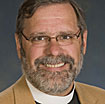Commentary on Mark 12:38-44
This reading from the Gospel of Mark is a two-act drama with some intriguing and troubling connections.
In verses 38-40, in what could almost be a riff on Psalm 146:3 (“Put not your trust in rulers, in mortals in whom there is no help.”), Jesus warns about the self-serving scribes who will be condemned for their simultaneous love for “show” and cynical lack of mercy–specifically to widows.
Verse 40 always reminds me (in a way that is unfair both to the scribes and to Italian-Americans) of a closing scene in The Godfather: Michael Corleone is standing as… well… godfather for his infant niece at her baptism. During the four-minute scene, the audio track remains with the baptismal rite while the video track toggles back and forth from the scene in the church to scenes of hit men under Corleone’s command preparing to murder several rivals. The murders themselves coincide exactly with Corleone’s renunciation of Satan and all his works. Melodramatic for sure, but no less so than the image of simultaneity suggested by Jesus: “They devour widows’ houses and for the sake of appearance say long prayers.”
The second part of the reading (verses 41-44) tells of the poor widow who donates two small copper coins–all she has–into the treasury. While this widow bears some resemblance to the widow in 1 Kings 17 (both are poor and are in some relationship to God), she serves as a model of humble faithfulness rather than as a sign of God’s provision for the lowly (or for the prophet). The juxtaposition of verses 38-40 with the widow’s offering brings into stark relief the ambiguity of institutions and systems and the demands of faithfulness.
Jesus says that the widow “gives more” than the wealthy because what she gives is a higher proportion of her total worth–in this case it is her total worth. The text does not say that the rich “make a show” of putting in their large sums, but that notion lingers from our hearing of verses 38-39.
It might be useful to spend some time imagining the posture and overall demeanor of the widow as she approaches the treasury. Most sermons I’ve heard have her hiding humbly in the shadows until she builds up the nerve to approach the coffers. But the tragedy of the scene is highlighted differently if the widow approaches with faithful dignity because the ambiguity and tension come when we consider that the widow gives her all in spite of the fact that the institution (broadly speaking) to which she remains faithful devours poor widows’ houses! She may be a model of giving–but in such paradoxical circumstances!
When I’m sitting in the congregation on November 8, I’d be curious to hear a sermon that develops along one of these trajectories. First of all, depending on your context and the specific nature of the hypocrisy in the community you serve, it would be powerful to preach into the first part of the gospel lesson. We’d like to identify ourselves with the widow of verses 41-44, but most of us North American Christians are the scribes of verses 38-40. Even when we live simply, we enjoy products and infrastructures whose provision devours the lives of the poor in the world. And no length of prayers can hide us and our love of what we have and what we’ve accomplished.
Whether we live simply or not, we do like to be noticed by others… even if what we like to be noticed for is how hard we try not to be noticed. There is no way to untangle us from our complicity (certainly no simple way) but we can and must, in Christ, bear the “greater condemnation” of honest judgment and discernment. We’ve already heard from Jesus that salvation for the rich is only possible because of God (Mark 10:27).
A second trajectory might head directly into the guilt and ennui brought on by our affluence. Think of the common routes our meditations take when we contemplate the story of the widow’s offering. Mine go something like this: “What’s the point of my small acts of faithfulness? Why bother? Even if I liquidate all my assets and give them to the poor, I might provide enough for one small soup kitchen to feed one hundred homeless for a week. But if I don’t liquidate my assets, I fail to demonstrate my total trust in the provision of God.
“I sit in the food court in the mall and watch as bag after bag of trash (containing aluminum cans and plastic bottles) are loaded up and then taken to landfills; and I know that this scene is repeated daily in thousands of venues around the world. Why do I bother recycling my two six-packs per week of diet cola? What is the meaning of my measly individual action? How can the faithfulness of the widow be sustained in me?”
The story of the widow’s offering suggests that faithful giving (and faithful living) is not for the sake of recipient but rather for the sake of (or maybe it would be more accurate to say proceeds organically from) the life of the giver. If the ends are assured in the economy of God, then only the means remain.
A sermon I do not need to hear is the one that entreats me to be more like the faithful widow. If we must hear a sermon focused on her giving and her gift, let her be a Christ figure rather than a faithful disciple figure. What makes that connection appealing is the difficulty (but rightness) of the forced analogy between her worthless coins and Jesus’ life which leads to the paradox that this worthless gift brings about the salvation of the world (cf. Philippians 2!).

November 8, 2009